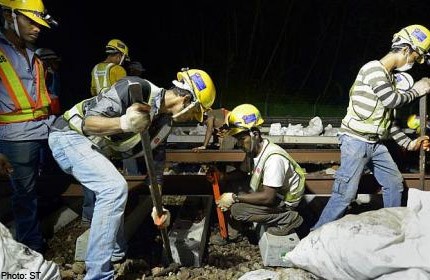Overhaul of MRT train lines shifts into high gear

SMRT is stepping up the overhaul of its two oldest train lines next year, by replacing the third rail and starting tests of a new signalling system.
It will also ramp up the replacement of timber sleepers with concrete ones, and is expanding the replacement of its running rail to cover longer stretches.
In essence, the operator is renewing the major components of the North-South and East-West MRT lines, sections of which are more than 20 years old.
Friday, SMRT Trains executive vice-president Lee Ling Wee told The Straits Times that it has already called a tender to replace the third rail - which supplies power to trains - on the North- South Line.
The operator is already in the midst of three other major projects involving both lines: replacing 188,000 timber sleepers which tracks rest on, replacing worn out tracks, and installing a new signalling system so trains can run at higher frequencies.
SMRT is looking into planned closures so that contractors and maintenance staff have more time to conduct the replacement works, which could mean some delays for commuters.
In the past, when it wanted to speed up cable replacements on the Circle Line, it closed stretches of the line temporarily on weekends.
The operator is also ramping up resources to minimise disruptions and speed up the works.
With each concrete sleeper weighing 275kg, it has engaged British firm Balfour Beatty to provide specialised vehicles to transport and replace them.
In order to increase the pace of replacement, the number of these road-rail vehicles will be increased from the current four to as many as 12 by April.
This will allow an estimated 400 sleepers to be replaced a night, or about 8,000 a month, explained Mr Lee.
SMRT expects to complete the replacement of sleepers on the North-South Line next year and the East-West Line by 2016 - three years ahead of the initial schedule.
As for the resignalling project, which will be completed in phases from 2016 to 2018, Mr Lee said trial runs of the system will begin early next year.

Get a copy of The Straits Times or go to straitstimes.com for more stories.